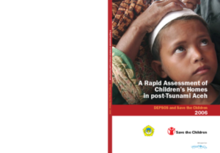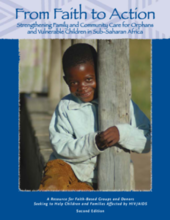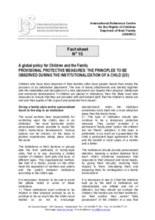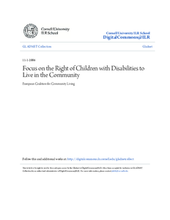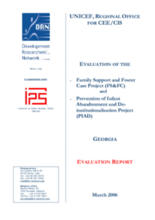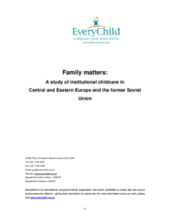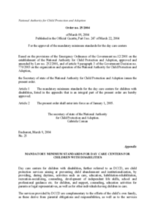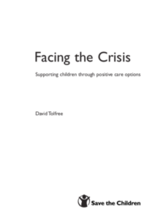Displaying 621 - 630 of 692
Examines institutional and family care in post-Tsunami Indonesia. Includes situational analysis, key issues, and recommendations.
A tool to encourage donors to fund community programs that keep children in family care, rather than simply funding orphanages. Describes the many strategies being used to invest in community-based care, and contains specific program examples.
A brief 2-page overview of appropriate residential institution characteristics. Includes information on staffing, and the optimum size of each family-like unit.
Advocates for the right of children with disabilities to live in the community. Provides recommendations on how to ensure a successful transition from institutional to community-based care. Focuses on the importance of family support and the right to education.
Evaluation of two alternative care programmes in Georgia. Focus on contributions towards the construction of gatekeeping systems for alternative care services. Includes detailed lessons learned and recommendations.
Results of a survey examining the quality of institutional care in Sri Lanka. Highlights gaps in existing policies and procedures.
A report discussing the advent and perpetuation of institutional care in Central and Eastern Europe and the Former Soviet Union prior to and since the end of the communist regime. It also provides examples of family-based care as models of care to substitute institutional care and offers recommendations to donors, NGOs and governments for child care reform based on their experience in CEE and FSU.
Outlines minimum standards for the operation of a day care center for children with disabilities in Romania.
A paper with guidelines for keeping children with families and providing proper care and protection for them. It provides examples and plans for those interested in planning care for separated children.
This report presents the survey Kevin Browne and colleagues conducted in 33 European countries to identify the number and characteristics of children less than three placed in residential care without their parents for more than three months during the year ending December 31, 2003. The purpose was to assess the rate and cost of residential care as a response to children in adversity.

